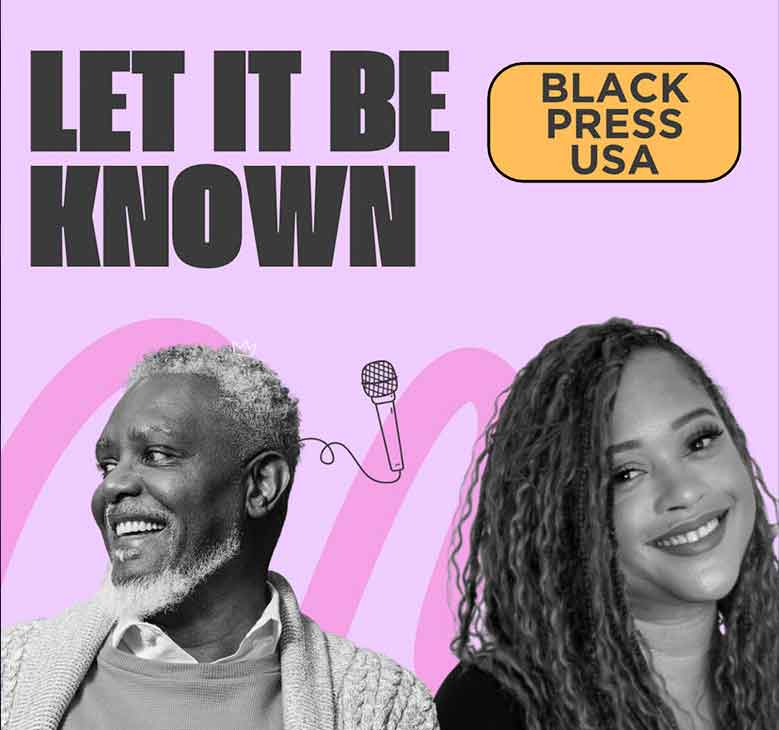Beyoncé, Tariffs, and the Battle for Black America
On the April 30 edition of the Black Press of America’s daily program Let It Be Known, hosts Stacy M. Brown and Niele Anderson discussed the economic threats posed by tariffs, the weaponization of federal institutions, and a troubling smear campaign against veteran White House correspondent April D. Ryan. The show opened with a pre-recorded video dissecting the real-world effects of Trump’s tariff policies, which have yet to fully hit consumer prices because companies previously stockpiled goods ahead of implementation.

Black Press USA Staff Report
On the April 30 edition of the Black Press of America’s daily program Let It Be Known, hosts Stacy M. Brown and Niele Anderson discussed the economic threats posed by tariffs, the weaponization of federal institutions, and a troubling smear campaign against veteran White House correspondent April D. Ryan. The show opened with a pre-recorded video dissecting the real-world effects of Trump’s tariff policies, which have yet to fully hit consumer prices because companies previously stockpiled goods ahead of implementation. The segment explained that cargo imports have sharply declined—down as much as 50 percent—signaling an impending supply shock. “When the pre-tariff inventory dries up, there will be shortages, and prices will go up,” the video noted. “This isn’t BS—this is the calm before the storm.” Following the clip, Brown and Anderson broke down how the policies disproportionately impact vulnerable communities. “We’re going to start feeling it in our pockets,” Brown warned, referencing recent reports from the Port of Los Angeles showing an expected 35 percent decline in shipping value. “It’s simple: supply goes down, prices go up.”
The hosts turned to another major concern—reports that the Trump administration has quietly activated the U.S. Postal Service to assist in mass deportations, while also forcing out more than 70 percent of the Department of Justice’s Civil Rights Division staff. “We haven’t felt the full impact yet,” Anderson said. “But the consequences for Black and brown communities will be devastating.” The broadcast grew more urgent as Brown and Anderson addressed the growing attacks on April D. Ryan, the longtime White House reporter for the Black Press, who broke the story about efforts to remove African American artifacts from the Smithsonian’s National Museum of African American History and Culture. Brown condemned the backlash, particularly from fellow Black journalists. “April Ryan is the longest-serving Black correspondent at the White House,” he said. “She’s earned her credibility. This campaign against her is unacceptable.”
Anderson added that April’s reporting has been verified by Rev. Dr. Amos C. Brown, who appeared on the show after receiving a letter from the museum about the return of his family Bible and one of the oldest books authored by a Black person. “April never said the chair was removed—she said it was targeted,” Anderson said. Brown added: “[For fellow Black journalists] to remove her reporting because the Smithsonian released a carefully worded denial? That’s a problem.” Anderson said the Smithsonian and the Trump administration bear responsibility for fueling confusion. “They’re playing a cat-and-mouse game with the truth,” she said. “Meanwhile, some Black journalists are aiding the erasure of Black history by turning on one of our own.” The discussion included sharp commentary on cultural ownership, with Anderson praising Beyoncé’s new country album for reclaiming the American flag and Black identity. “That flag is ours, too,” Anderson said. “We’re not giving it up. Our ancestors paid the price.”
The episode also aimed at NFL Hall of Famer Chris Carter for suggesting Shedeur Sanders needed to be “taught a lesson” after not being drafted. “That’s ‘stay in your place’ language,” Anderson said. “This is deeper than football. It’s about control and systemic racism.” From housing costs to erasing history, Brown and Anderson framed the current moment as one of real danger—but also one that requires solidarity. “Black journalists should not be attacking each other,” Brown said. “We need to be the voice that the community turns to, not the voice that helps tear it apart.” The show concluded with a call to action: a June 14 push to flood social media with images of former President Obama—Trump’s birthday—while lifting Black legacy, Black voices, and Black truth.









